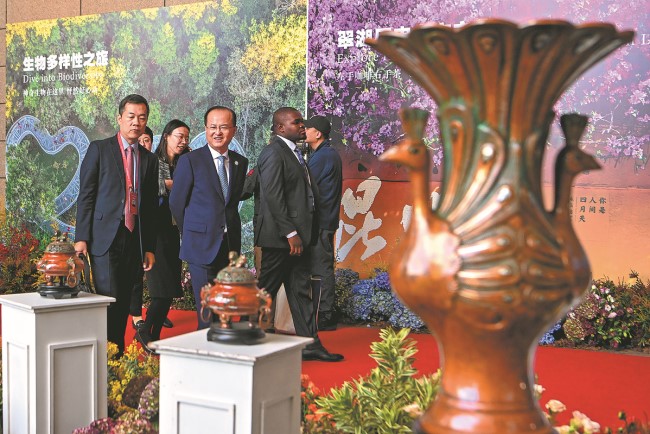
Yunnan spotted copper attracts visitors at the China International Friendship Cities Conference in Kunming, Yunnan province, on Monday. [Photo by Li Jiaxian/China News Service]
Exchanges between sister cities are becoming increasingly prominent in today's turbulent international environment, as they help foster mutual prosperity and strengthen people-to-people relationships between nations, officials and experts from various countries said.
They made the remarks at the China International Friendship Cities Conference in Kunming, Yunnan province, which began on Monday.
Peng Qinghua, vice-chairman of the Standing Committee of the National People's Congress, said that China highly values the role of international sister cities in fostering subnational cooperation, enhancing friendships and promoting cultural exchanges.
He expressed hope that sister cities will seize opportunities for collaboration, drive innovative development and create projects that benefit communities, contributing to global peace, stability and prosperity.
Since 1973, when Tianjin and Kobe, Japan, signed a friendship city agreement — the first of its kind between a Chinese city and a foreign city — local Chinese governments have formed 3,046 pairs of sister provinces/states and sister cities with 2,469 provinces/states and sister cities in 147 countries, creating a vast network of global friends, according to Yang Wanming, president of the Chinese People's Association for Friendship with Foreign Countries.
Exchanges between sister cities have created direct routes for economic and trade cooperation and have facilitated investment activities, including the building of industrial parks and manufacturing bases, said Yang, who is also president of the China International Friendship Cities Association.
The agreements have led cities to share their expertise in sustainable development, the construction of smart cities and digital governance, leading to improvements in people's livelihoods, Yang said.
Yukio Hatoyama, former prime minister of Japan, emphasized the importance of discussing common prosperity and a shared future in a world now filled with conflicts and uncertainty. He stressed that friendly relations, whether between individuals, cities or countries, develop through continuous interaction and trust-building. Forming cliques and excluding others only deepens division, Hatoyama said.
Emmanuel Sinzohagera, speaker of the Burundi Senate, said he hopes the African nation will establish more sister-city relationships with China to learn from its urban development experience and enhance his country's economic and technological development.
Anouphab Tounalom, party secretary of Vientiane and president of the Vientiane People's Council of Laos, said that the world is now confronted with various problems, including instability and economic uncertainty both regionally and internationally. "In light of these challenges, it is more essential than ever for all of us to come together in unity," Tounalom said.
Jordi Vaquer, secretary-general of the World Association of the Major Metropolises, said that sister cities have always been important because they have preserved connections between peoples, even when there are tensions between nations.